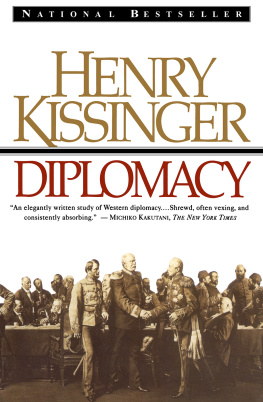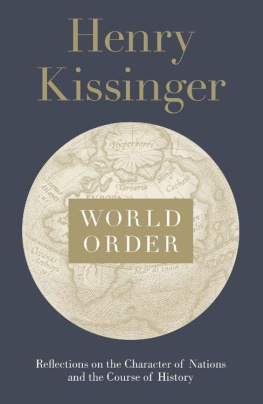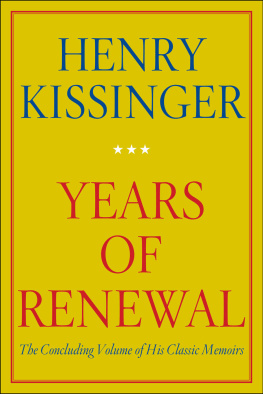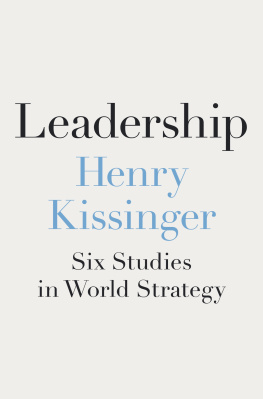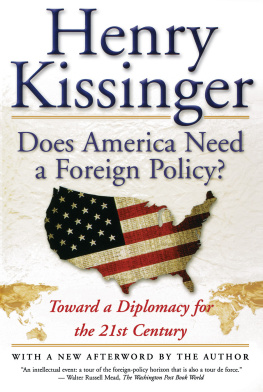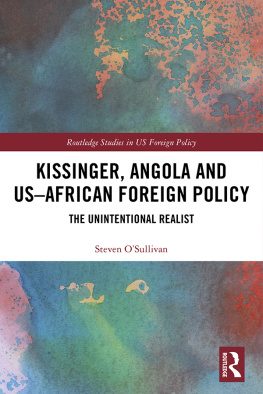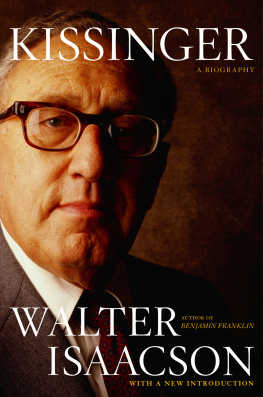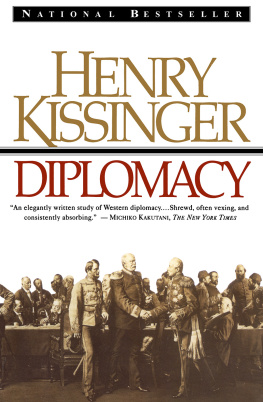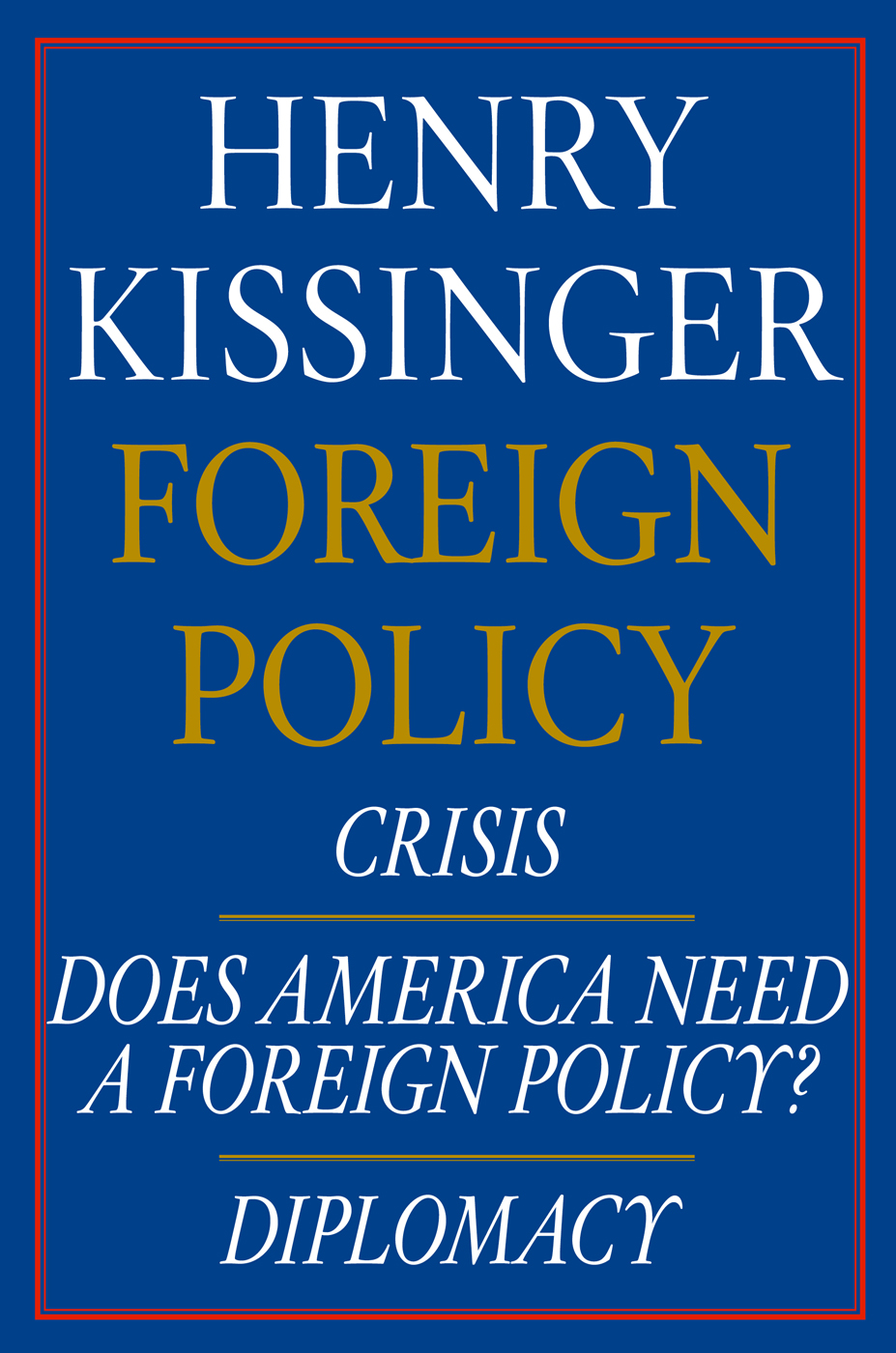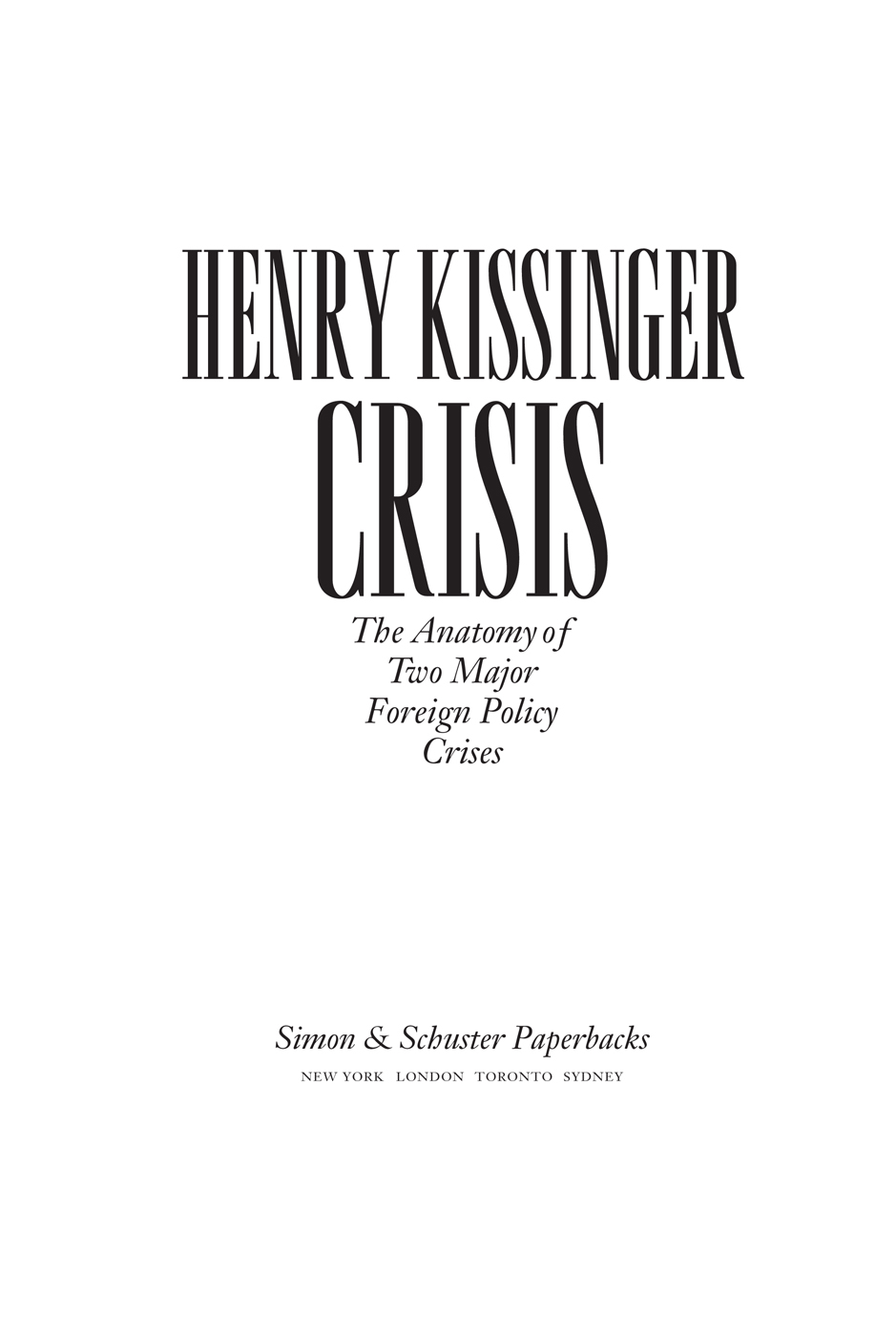Thank you for downloading this Simon & Schuster eBook.
Join our mailing list and get updates on new releases, deals, bonus content and other great books from Simon & Schuster.
C LICK H ERE T O S IGN U P
or visit us online to sign up at
eBookNews.SimonandSchuster.com
We hope you enjoyed reading this Simon & Schuster eBook.
Join our mailing list and get updates on new releases, deals, bonus content and other great books from Simon & Schuster.
C LICK H ERE T O S IGN U P
or visit us online to sign up at
eBookNews.SimonandSchuster.com
Praise for Crisis
In a surprisingly gripping account... what emerges is a vivid portrait of one of the 20th centurys most influential statesmen operating at full tilt and in the full flow of his powerin rapid kaleidoscopic sequence and in various mixtures cajoling, reassuring, flattering, delaying, smoking out and threatening Soviet, Israeli, Egyptian, British and United Nations diplomats, soothing the concerns of senators, parrying bureaucratic intruders, and periodically updating a distracted and detached president Richard M. Nixon embroiled in the constitutional crisis of Watergate.
The New York Times
Crisis is captivating in a novel way: This highly suspenseful minute-by-minute account of the Arab-Israeli war of October 1973 and the fall of Saigon in April 1975 consists largely of the phone transcripts of then-Secretary of State Kissinger. The phrase fog of war refers to the difficulty of making intelligent decisions in combat.... This book shows how similar diplomacy can be to combat, and gives the reader a fly-on-the-wall perspective on the nerve-wracking process of how crises are met and, if all goes well, contained.
National Review
Crisis is exciting because of the necessity to reach quick decisions by phone.
Richmond Times Dispatch
BOOKS BY HENRY KISSINGER
Crisis: The Anatomy of Two Major Foreign Policy Crises
Ending the Vietnam War: A History of Americas Involvement in and Extrication from the Vietnam War
Does America Need a Foreign Policy?: Toward a Diplomacy for the 21st Century
Years of Renewal
Diplomacy
Observations: Selected Speeches and Essays, 19821984
Years of Upheaval
For the Record: Selected Statements, 19771980
White House Years
American Foreign Policy: Three Essays
Problems of National Strategy: A Book of Readings (editor)
The Troubled Partnership: A Reappraisal of the Atlantic Alliance
The Necessity for Choice: Prospects of American Foreign Policy
Nuclear Weapons and Foreign Policy
A World Restored: Metternich, Castlereagh, and the Problems of Peace: 181222

SIMON & SCHUSTER PAPERBACKS
Rockefeller Center
1230 Avenue of the Americas
New York, NY 10020
www.SimonandSchuster.com
Copyright 2003 by Henry A. Kissinger
All rights reserved,
including the right of reproduction
in whole or in part in any form.
Portions of the introductions to the conversations presented in this book previously appeared in Years of Upheaval, copyright 1982 by Henry A. Kissinger; and years of Renewal, copyright 1999 by Henry A. Kissinger.
First Simon & Schuster paperback edition 2004
SIMON & SCHUSTER PAPERBACKS and colophon are registered trademarks of Simon & Schuster, Inc.
Designed by Amy Hill
Cover design by Jackie Seow
Author photograph 1997 Darleen Rubin
The Library of Congress has catalogued the hardcover edition as follows: Henry Kissinger, date.
Crisis : the anatomy of two major foreign policy crises / Henry Kissinger.
p. cm.
1. Kissinger, Henry, date. 2. Israel-Arab War, 1973. 3. Vietnamese Conflict, 19611975. 4. StatesmenUnited States, Biography. 5. United StatesForeign relations19691974Decision making. 6. United StatesForeign relations19741977Decision making. I. Title.
E855.K56 2003
327.73056/09/047/dc22 2004269803
ISBN 0-7432-4910-0
ISBN 0-7432-4911-9 (Pbk)
To my grandchildren, Sam, Sophie, Will, and Juliana
Contents
Introduction
W hile I served in the Richard M. Nixon and Gerald R. Ford administrations as National Security Adviser and then Secretary of State, holding both positions simultaneously from 1973 until the end of 1975, my secretaries transcribed the overwhelming majority of my telephone conversations. The original transcripts were never edited at the time they were typed. The purpose of making them was to enable me to follow up on promises made or understandings reached and to incorporate them into memoranda to the President or other records. In 1977, I deposited these working papers at the Library of Congress and, in 1980, made them available to review by the Department of State. Since 1997, these conversations have been used by the State Departments historical division for publication in its foreign policy series. In 2001, I turned over all the National Security Council conversations to the National Archives and the conversations as Secretary to the State Department to enable these agencies to process them with a view to their general availability.
These conversations convey the mood in which major decisions were made and the attitudes from which national policy was compounded. Since decisions on the telephone reflect the urgency of the moment, they do not always contain the full range of underlying considerations. A complete history would require a record of the various interagency meetings and transcripts of personal conversations with the President. Nevertheless, these conversations give an accurate picture of the imperatives driving decisionsespecially during the fast-moving events described in this volume. Each section is introduced by a summary narrative, which is continued where there are gaps in the telephonic transcripts. Where necessary to achieve continuity, I included summaries of appropriate interdepartmental meetings.
This book deals with two crises that were handled importantly on the telephone: the Middle East War of October 1973 and the final withdrawal from Indochina in 1975. The Middle East War involved frequent use of the telephone because I was in New York when it broke out, attending the United Nations General Assembly, and afterward because time pressures complicated the use of more formal means of communication. The final extrication from Vietnam had to be accomplished under emergency conditions requiring frequent telephone contact.
The two crises covered in this volume were accompanied by domestic crises in the United States. The Middle East War occurred in the midst of the Watergate crisis; indeed, its two culminating events spanned the entire period of the war. During the opening of hostilities on October 6, President Nixon was obliged to deal with the resignation of Vice President Spiro Agnew. During the second week, Nixon was negotiating a procedure for releasing the White House tapes. This led to the resignation of Elliot Richardson as Attorney General and the dismissal of Archibald Cox as special prosecutor. The so-called Saturday Night Massacre occurred while I was in Moscow on October 20 negotiating a Middle East cease-fire. It led soon after to the start of impeachment proceedings against President Nixon in the House of Representatives. As a result, while these efforts were taking place, Alexander Haig wasas the conversations showa principal contact to Nixon even for me.

